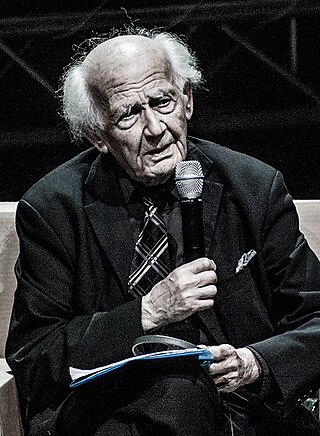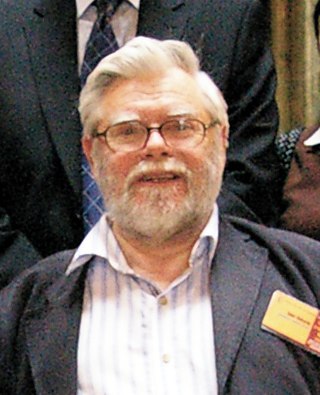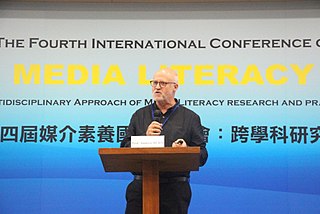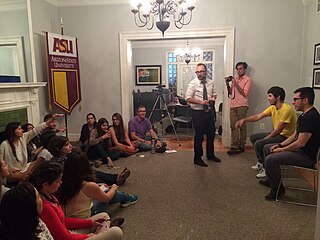Related Research Articles

A polymath is an individual whose knowledge spans a substantial number of subjects, known to draw on complex bodies of knowledge to solve specific problems.

Manuel Castells Oliván is a Spanish sociologist. He is well known for his authorship of a trilogy of works, entitled The Information Age: Economy, Society and Culture. He is a scholar of the information society, communication and globalization.

Creativity is a characteristic of someone or some process that forms something new and valuable. The created item may be intangible or a physical object.

Anthony Giddens, Baron Giddens is an English sociologist who is known for his theory of structuration and his holistic view of modern societies. He is considered to be one of the most prominent modern sociologists and is the author of at least 34 books, published in at least 29 languages, issuing on average more than one book every year. In 2007, Giddens was listed as the fifth most-referenced author of books in the humanities. He has academic appointments in approximately twenty different universities throughout the world and has received numerous honorary degrees.
New media are communication technologies that enable or enhance interaction between users as well as interaction between users and content. In the middle of the 1990s, the phrase "new media" became widely used as part of a sales pitch for the influx of interactive CD-ROMs for entertainment and education. The new media technologies, sometimes known as Web 2.0, include a wide range of web-related communication tools such as blogs, wikis, online social networking, virtual worlds, and other social media platforms.

Zygmunt Bauman was a Polish-born sociologist and philosopher. He was driven out of the Polish People's Republic during the 1968 Polish political crisis and forced to give up his Polish citizenship. He emigrated to Israel; three years later he moved to the United Kingdom. He resided in England from 1971, where he studied at the London School of Economics and became Professor of Sociology at the University of Leeds, later Emeritus. Bauman was a social theorist, writing on issues as diverse as modernity and the Holocaust, postmodern consumerism and liquid modernity.

In the arts, bricolage is the construction or creation of a work from a diverse range of things that happen to be available, or a work constructed using mixed media.
Communication design is a mixed discipline between design and information-development concerned with how media communicate with people. A communication design approach is concerned with developing the message and aesthetics in media. It also creates new media channels to ensure the message reaches the target audience. Due to overlapping skills, some designers use graphic design and communication design interchangeably.
Francis David Peat (Born 18 April 1938 Waterloo, England died 6 June 2017 in Pari Italy) was a holistic physicist and author who has carried out research in solid state physics and the foundation of quantum theory.
LEGO SERIOUS PLAY is a facilitation methodology developed at The Lego Group. Since 2010 it is available under an open source community-based model. Its goal is improving creative thinking and communication. People build with Lego bricks 3-dimensional models of their ideas and tell stories about their models. Hence the name "serious play".
Jeffrey Weeks is a gay activist and an historian and sociologist specialising in work on sexuality.
Design thinking refers to the set of cognitive, strategic and practical procedures used by designers in the process of designing, and to the body of knowledge that has been developed about how people reason when engaging with design problems.
Graeme Turner is an Australian professor of cultural studies and an Emeritus Professor at the University of Queensland. During his institutional academic career he was a Federation Fellow, a President of the Australian Academy of the Humanities, founding Director of the Centre for Critical and Cultural Studies at the University of Queensland, and Convenor of the ARC Cultural Research Network.
John Brookshire Thompson is a British sociologist. He is a sociology professor at the University of Cambridge and a fellow of Jesus College.

Tudor Rickards is a self-published author of non-fiction and fiction, a business academic, and a scientist. He is Professor Emeritus at University of Manchester and formerly Professor of creativity and Organisational change at Alliance Manchester Business School. His fiction works include The Unnamed Threat: A Wendy Lockinge Mystery (2019), Seconds Out (2018) and Chronicles of Leadership (2016). His non-fiction includes Tennis Matters: A Leaders We Deserve Monograph (2015), Tennis Tensions (2015), The Manchester Method (2015) and The Double Houdini (2016).
A significant construct in language learning research, identity is defined as "how a person understands his or her relationship to the world, how that relationship is structured across time and space, and how the person understands possibilities for the future". Recognizing language as a social practice, identity highlights how language constructs and is constructed by a variety of relationships. Because of the diverse positions from which language learners can participate in social life, identity is theorized as multiple, subject to change, and a site of struggle.

Andrew Burn is an English professor and media theorist. He is best known for his work in the fields of media arts education, multimodality and play, and for the development of the theory of the Kineikonic Mode. He is Emeritus professor of Media at the UCL Institute of Education.

The term serious play refers to an array of playful inquiry and innovation methods that serve as vehicles for complex problem-solving, typically in work-related contexts. Lego Serious Play is one of the best known examples; however, serious play methods also include improv theater, role play exercises, low fidelity prototyping, as well as certain simulations and gamification interventions, etc.
David Dennis Buckingham, is a media, communications and education scholar and retired academic.
David Hesmondhalgh is a British sociologist. He is currently Professor of Media, Music and Culture at the University of Leeds. His research focusses on the media and cultural industries, critical approaches to media in the digital age, and the sociology of music.
References
- ↑ "Recent Publications". Grapevine. Alumni Office, University of York (Autumn/Winter 1997): 23.
- ↑ David Gauntlett (1995), Moving Experiences: Understanding Television's Influences and Effects, London: John Libbey
- ↑ David Gauntlett (2005), Moving Experiences, second edition: Media Effects and Beyond, London: John Libbey
- ↑ Will Woodward (1999), 'Viewers admit their guilt at watching too much TV', The Guardian newspaper, Friday 30 April 1999
- ↑ David Gauntlett and Annette Hill (1999), TV Living: Television, Culture and Everyday Life, London: Routledge
- ↑ Charlie Peverett (2002), Review of 'Media, Gender and Identity' Archived 12 August 2008 at the Wayback Machine , HERO: The official online gateway to Higher Education, 2002
- ↑ AHRC Case Studies: Young People's Engagement with Online Immersive Worlds Archived 9 June 2008 at the Wayback Machine , Arts and Humanities Research Council, May 2008
- ↑ Dan Sabbagh (2008), 'Viewers Boys and girls stay in to play on BBC's virtual island Adventure Rock', The Times newspaper, 22 May 2008
- ↑ Julian McDougall (2007), 'Creative Transformations: What to do with "Media 2.0"?', In The Picture – The Media Education Magazine [ permanent dead link ], Issue 58, November 2007
- ↑ David Gauntlett (2000), 'A double dose of digital drivel', The Times Higher Education Supplement, 22 September 2000
- ↑ David Gauntlett, ed (2000), Web.Studies: Rewiring Media Studies For The Digital Age, London: Arnold
- ↑ David Gauntlett and Ross Horsley, eds (2004), Web.Studies: Second edition, London: Arnold
- ↑ Times Higher Education Supplement, Awards Shortlist Archived 5 November 2007 at the Wayback Machine , September 2007.
- ↑ David M. Barlow and Brett Mills (2008), Reading Media Theory: Thinkers, Approaches, Contexts, London: Pearson Education, p.422.
- ↑ University of Oslo (2007), Creative Production, Self-expression and Identity Archived 31 May 2008 at the Wayback Machine , Intermedia, University of Oslo
- ↑ David Gauntlett (1997), Video Critical: Children, The Environment and Media Power, London: John Libbey
- 1 2 David Gauntlett (2007), Creative Explorations: New approaches to identities and audiences, London: Routledge
- ↑ Anthea Lipsett (2005), 'Lego and professor click over research', The Times Higher Education Supplement, 8 April 2005
- ↑ Arts and Humanities Research Council, list of research awards
- ↑ Times Higher Education (2008), 'Grant winners', 7 February 2008
- ↑ British Film Institute, Media Studies Conference 2007 Archived 7 November 2007 at the Wayback Machine , 4–6 July 2007
- ↑ Transforming Audiences International Conference, 6–7 September 2007
- 1 2 Andy Ruddock (2008), 'Media Studies 2.0? Binge Drinking and Why Audiences Still Matter', Sociology Compass, Volume 2 Issue 1 Page 1-15, January 2008.
- ↑ 'Towards a Brave New World? The Media Studies 2.0 Debate' Archived 3 October 2011 at the Wayback Machine , presentation by Geoff Lealand, University of Waikato, at AMES conference, May 2007
- ↑ Gauntlett, David. (2011). Making is connecting : the social meaning of creativity, from DIY and knitting to YouTube and Web 2.0. Cambridge, UK: Polity Press. ISBN 978-0-7456-5002-9. OCLC 682281412.
- ↑ Polity Press, 'Making is Connecting: Second Expanded Edition'